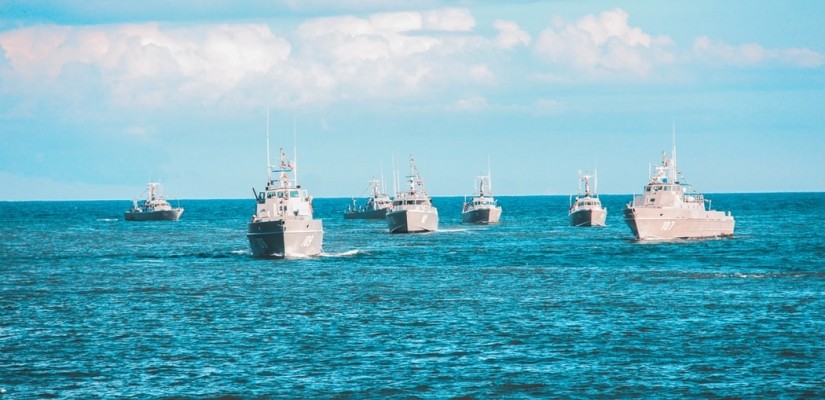Military tensions in the South China Sea have gradually increased in recent years. China’s claim on much of the maritime territory in the South China Sea – a territory China demarcates with the strongly contested “nine-dash line” – is what causes frictions with Southeast Asian littoral states and Western states such as the US. The South China Sea is rich in natural resources, including gas and oil, provides critical fishing grounds, and constitutes a key shipping lane for international trade. This explains why the claimants of territory in the South China Sea are adamant about defending their waters. While diplomatic debates about an international agreement on issues pertaining to the South China Sea have been held since the 1990s, they have not been conclusive. At the beginning of November 2019, however, China’s government stated that it is ready to cooperate with the Association of Southeast Asian Nations (ASEAN) on a Code of Conduct (COC) in the disputed waters. The COC agreement is set to be finalized in 2021. Depending on its regulations, the COC has the potential to alter strategic and operational conditions for involved states and businesses.
Parties involved in the maritime dispute include China, Taiwan, the Philippines, Vietnam, Malaysia, Indonesia, Brunei, and the US. The Philippines was a central opponent of China’s South China Sea ambitions, filing a lawsuit against China. In July 2016, an arbitration tribunal based on Annex VII of the United Nations Convention on the Law of the Sea (UNCLOS) ruled that China’s claims of territory within the nine-dash line does not conform with international law. China, however, maintained its stance on the issue and continued to regard the nine-dash line as an integral part of its territory. Ever since, the Philippines’ foreign policy has shifted, displaying leniency and a greater degree of allegiance with China. Economic benefits and trade with China are a central motivation for the Philippines in this context. In contrast to the Philippines, Vietnam remains an opponent of China on this issue. Military maneuvers by the Chinese navy have intimidated Vietnamese fishing and survey ships, increasing tensions. Similarly, Indonesia has become more assertive in exerting authority over its territory in the South China Sea.
By contrast, Malaysia is likely to retain a more restrained stance to avoid escalating the conflict. While Thailand and Singapore are not directly involved in the dispute, they will be included in COC talks alongside the other eight ASEAN members. Forecasts suggest that Thailand and Singapore will remain relatively neutral and focus on mediation efforts. Finally, the US is not invited to COC talks, yet its role in the South China Sea dispute remains critical. The US has demonstrated antagonism towards China’s claim in the South China Sea. Defending international laws on maritime territory and seeking to restrain China’s geopolitical and economic reach, the US has sent air force and navy troops to surveil the waters.

The creation of a COC after roughly two decades of contention among involved states may indicate a de-escalation of tensions in the disputed ocean. However, it is imperative to remain critical of what the COC can contribute to conflict resolution in the South China Sea. China demands, for instance, that joint military exercises with third parties should be agreed upon by COC signatories. Moreover, China demands that resource development with states outside the region should not be permitted. This would have the result of pushing Western states out of the area and could strengthen China’s claim in the South China Sea.
Other points that must be further discussed among ASEAN and China are the undefined geographic reach of the South China Sea, dispute settlement mechanisms, and the legal status of the COC. These are vital, as they can create risks and perpetuate disputes if they are not clearly defined. ASEAN and China must agree on what maritime territory exactly is included in the COC and whether the COC is legally binding or not. In terms of dispute settlement mechanisms, it is likely that the COC’s purpose will be to manage conflict instead of completely resolving it. In order to successfully craft a COC agreement, ASEAN members must resolve internal disagreements and unify in their conflict management aims. Inhibiting unity within ASEAN is the fact that even ASEAN members that are not directly involved in the South China Sea dispute participate in negotiations and can veto proposals. China can take advantage of this disunity within ASEAN to further its own interests, potentially weakening ASEAN’s leverage in the long-term.
The implementation of a COC agreement is important to businesses since it can potentially determine whether natural oil and gas extraction will become more difficult for some companies, depending on their country of origin. If the COC is signed as a legally binding treaty, it could de-escalate tensions in the region and provide more security on shipping routes. If the COC’s regulations decrease the potential for conflict and enhance security in the South China Sea, insurance costs for trading companies could also decrease.
Finally, defense contractors may benefit from conflict in the South China Sea as they provide their countries with arms. Trading companies, however, will continue to suffer from escalating conflict. Treatment of businesses from within the region and from outside the region could also vary. For example, if territorial disputes remain unsettled, the price of fish and the cost of fishing in these waters could increase. Furthermore, while the COC has the potential to offer opportunities and relief for regional companies, businesses from the US, for instance, may experience setbacks following the adoption of the COC in 2021. Therefore, it remains to be seen to what extent the COC can impact companies operating in the South China Sea.
